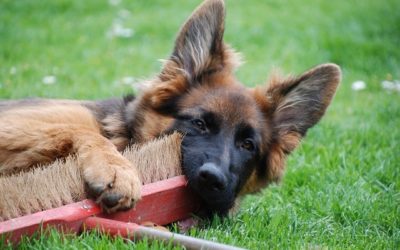Most dog trainers refer to puppy biting as ‘play biting’.
You’ve been on the receiving end of a puppy bite? Yep, we can all agree that it can be painful. Our little four-legged friends have about 28 teeny-tiny razors teeth that seem to be naturally attracted to your toes and fingers.
It is what they do when they play with their brothers and sisters in the little. However, it can be painful and irksome when your favourite pup seems to be all teeth. And while this is an entirely normal stage for a puppy’s development, you can help them transition without them taking a bite of you every time you play together.
Why do puppies bite?
In order to understand how best to help your puppy stop their nibbling behaviour, you need to understand why they do it in the first place. Like babies, puppies also explore and discover their world by mouthing different items. That means that they will try biting everything, whether appropriate or not including your face, hands, and feet, even your new sofa.
If your puppy is treating you and everything in your home like some gummy, here are five questions you should ask yourself:
1. Is your puppy overtired?
Perhaps, the most serious and common concern for new dog parents is identifying signals of hunger, fear, aggression, and tiredness. The unfortunate part about puppies is that they can bite harder when excited than when angry. If you play more often with your puppy, you will notice when they are too excited and tired. A tired puppy can be dangerous when it comes to biting. They may bite you and growl ferociously when disturbed. Make sure you only to engage your puppy in a game when they are full of energy and for short periods of time.
2. Are you too rough during playtime?
How you play with your pup also matters. If it is your first time being a pet owner, you may be giving your puppy conflicting signals or playing too rough with them. Take time to learn your little friend’s movements, vocalisations, and interpret them correctly. We all love a bit of rough ‘n tough but don’t let it get out of hand and make sure you remain the Alpha Dog.
3. Are you forcing cuddles?
Are you the type that keeps hugging and cuddling your puppy? Yes we know they are so cute and you can’t leave them alone, but like people some puppies don’t like cuddles, and forcing them into one only invites a big, painful bite as they try to free themselves from your hands. Understand what your puppy likes and stick to it; they usually change as they grow, and your relationship develops. A bit of ‘me’ or ‘alone’ time is good for your puppy.
4. What is your reaction when your puppy bites?
Puppy bites can leave tooth marks or even draw blood on your hands and feet. While this may be a normal puppy behavior in the early days, how you react to the bites will determine how the puppy treat you in the future. It’s a learnt behavior. Laughing, oohing and screaming in fact sends a positive signal to your puppy—that they can get a reaction from you every time they bite – and encourages them to continue biting.
5. Is your puppy experiencing teething?
Just like babies puppies also experience soreness in their gums, especially between six and eight weeks of age. This stage can be tougher for some puppies than others, but if your puppy is around that age, they could be experiencing teething and could just be rubbing and looking for pressure on their gums to ease the soreness. However, if your puppy is older than three months, it’s unlikely teething is your problem and bites will not doubt be more painful as the little razor-like teeth have grown along with the size and power of your pup.
Top Tips On How To Stop Your Puppy Biting

If your fur baby is treating your fingers and toes like a chewy toy, here are a few ideas to handle it like and expert;
Reward /praise positive behaviour
Part of disciplining your puppy includes rewarding good behaviour. Bite training also goes hand in hand with discipline. As you reward your pup for correctly using their litter box also reward them for playing without biting you. Never punish your puppy physically by hitting them. Doing so only encourages the behaviour that you dislike. Punishing also makes your puppy fearful, it may distance itself from you, and does not develop a positive relationship of trust.
Their gums could be the problem
If your puppy is in the teething phase, then their growing teeth and gums can be painful. That’s when they like to bite firmly to soothe the painful irritated gums. And they will bit and chew on anything they come across – including you or your new pair of shoes! It is worth understanding and remembering that you cannot stop the teething phase, but you can help your puppy stop biting you by providing things that they can bite or chew and be a supportive dog owner.
If you haven’t introduced toys, this could be the best time to do so. Introduce dog toys that are safe to chew on and help your puppy play with them. You can try rubber, safe bones and stuffed toys. Ensure that these items are available for your puppy because when they don’t gain access to them, they will find other things to bite or chew which includes your fingers and toes.
We like to give our puppies some thing hard to chew on. We’re sure they love getting their teeth stuck into something like these wood chews.
Try Petstages Dog Chew Toys. They provide safe, natural and healthy chewable sticks.
Teach them that biting means ‘game over’
If your puppy always bites you when playing, immediately discontinue the play to teach them that this behavior is not acceptable and means that they will get nothing. If this happens even when you are not playing, say NO firmly and look away or walk away. Puppies don’t like being ignored. If you do this repeatedly, your puppy will discover that biting is not a good way of getting your attention. You also need to be consistent with your responses. Reprimanding one bite and laughing on the next will only invite them to keep on biting.
Be the mummy dog
Todd Langston from the Dog Psychology Center trainer, and protégé of Dog Whisperer Cesar Millan, says yelping like a mother dog sends a signal to the puppy that what they are doing is wrong, and that you are not happy with it. Yelping, especially when it comes from a mother dog, sounds like a scold to the little puppy. You can yelp or make a doggy sound almost instantly when the puppy bites. This will help your puppy learn not to bite you because they will be scolded. Langston also recommends redirecting with a toy or a piece of food. You can use bacon or any other favourite food particularly those with a strong smell to redirect the puppy every time they become too nippy.
Teach your puppy bite inhibition
In most cases, puppies are born in a litter with brothers and sisters who act as their first playmates. It is during these stages that your puppies learn to mouth appropriately. If a puppy nips or chomps down on his sister or brother during playtime, they yelp to signal ‘hey that hurts’ and a temporary discontinuation of play may result, and that’s how they learn that biting hurts. If you bought your puppy while still very young, you might need to train them yourself as they may have missed the opportunity to learn this concept with their brothers and sisters.
Hire a trainer
When training your puppy, always keep in mind that biting is a normal behaviour. It is their natural way of exploring their world. Your puppy does not do it deliberately and doesn’t know that you get hurt. Play with your puppy often, stay calm when bitten, and be patient with your little furry friend. However, if your pup seems to bite out of anger or fear, he or she may require professional help. The same if you are unsure of quite what to do or find it’s not working. You can invest in a qualified dog trainer who will help stave off any problems your puppy may be having.
If your puppy seems too aggressive to handle or none of the methods mentioned above seems to work then perhaps it’s time to seek professional help. Hire a professional dog trainer who will help shape your little maniac play biter into a less mouthy and polite puppy. Remember to give your dog enough time to learn, and hopefully you only need a couple of sessions to learn some strategies you can follow – your trainer will have the professional capabilities of changing your puppy into a delightful dog to own.
Whichever method you use to stop your puppy biting remember to give them time to learn and make being a puppy a positive experience for everyone.
Good Luck!






